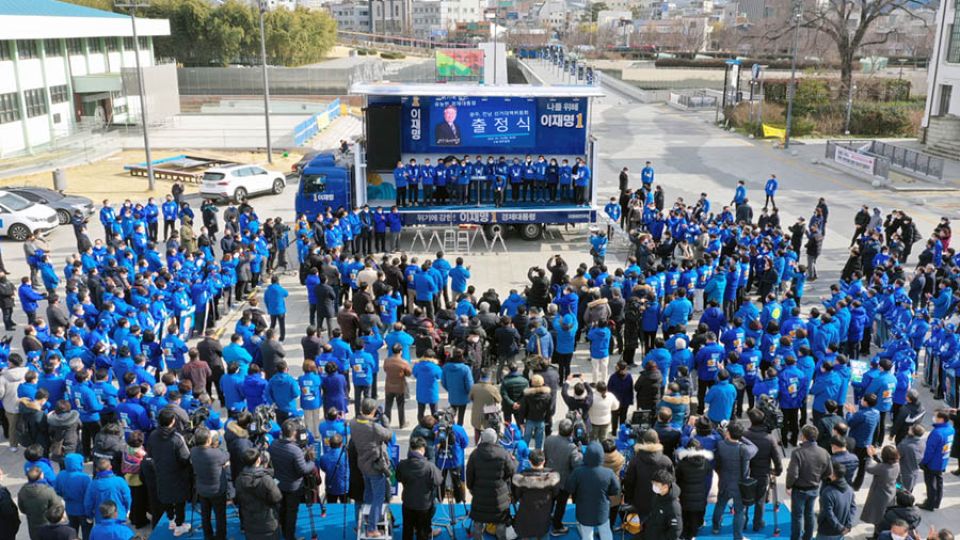February 16, 2022
SEOUL – In every election, candidates backed by major parties — as well as minor league lone rangers — travel across provinces, appear on TV, buy adverts on newspapers and run large-scale campaign teams staffed with experts and heavyweights across industries.
All of these obviously come with hefty price tags, and while each election is mostly remembered as a competition among candidates appealing to meet the eyes of voters, each campaign only comes to existence with billions of won gathered and spent backstage.
For the 20th presidential election on March 9, the National Election Commission is allowing each candidate to spend up to 51.3 billion won ($42.8 million) for his or her entire campaign, up 315 million won from the 50.9 billion won limit for the previous presidential election.
The amount is calculated by multiplying 950 won with the number of South Korea’s population, and adjusting the figure in accordance to changes in the nationwide consumer price index.
Candidates who register for the election are allowed to prepare 10 percent of the amount, or about 5.1 billion won, through donations. The rest of the campaign funds must be prepared by the candidate or the political party he or she is associated with.
The election watchdog fully reimburses the campaign spending for candidates who win at least 15 percent of votes in the election, and the commission pays back 50 percent for those scoring between 10 and 15 percent of tallied votes.
Reimbursement is not available for campaign spending not reported to the authority or exceeding the limit imposed for the election.
While the numbers look excessive for a presidential candidate to spend on an election, records show that many candidates, especially those backed by major political parties, do spend near the limit set for each election.
President Moon Jae-in and the Democratic Party of Korea spent 48.33 billion won in the 19th presidential election, 94.8 percent of the 50.9 billion won limit set by the election watchdog.
Rep. Hong Joon-pyo and the Liberty Korea Party, the predecessor of the People Power Party, spent 33.9 billion won on the election, while Ahn Cheol-soo and the People’s Party poured 43 billion won into his campaign.
The three candidates and their parties were fully reimbursed for their campaign spending, as they scored more than 15 percent of votes tallied on election day.

Presidential nominee Yoon Suk-yeol of the main opposition People Power Party delivers a speech during a campaign event in central Seoul on Tuesday. (Joint Press Corps)
Exact figures on how much is being spent on the ongoing election is yet to be seen via official records, but candidates with party allegiance, even those who failed mid-way, have already spent huge sums to get their names out on primaries and media coverage.
The ruling Democratic Party of Korea started its primaries with nine candidates in July 2021, and each candidate paid a deposit of 100 million won just to take their chances on the preliminary round. In the main primaries race, the candidates had to make another deposit of 3 billion won to register.
The main opposition People Power Party required its candidates to pay a 30 million won deposit to register for its preliminary primaries.
Parties impose such requirements to finance their primaries, and deposits are not returnable to candidates, regardless of how early they drop out of the race.
The deposit requirement is separate from registering with the National Election Commission to officially run for the election. All candidates registering to run are required to pay a 300 million won deposit to the election authority, and 20 percent of it has to be paid if one wants to register as a preliminary candidate.
After selecting their final candidates, parties start pouring in even more money to fund their candidates’ travels to regions — along with their advisers, assistants and supporters — to hold campaign events, draw up promises, and pay for lodging and meals throughout.
For the ongoing presidential race, Lee Jae-myung of the ruling Democratic Party of Korea got himself a bus to travel across the country to meet voters, while his main rival Yoon Suk-yeol of the main opposition People Power Party borrowed a whole train to travel to all corners.
People Power Party Chairman Lee Jun-seok said in a radio interview on Feb. 10 that his party is pouring in a “tremendous amount of money” to install 255 liaison offices across the country and run election campaign vehicles.
During the election, major candidates run at least hundreds of campaign vehicles, which are mostly trucks modified with lighting and sound equipment, as a well as a widescreen TV to run videos in the background.
Parties also recruit campaigners to dance along to music made custom made to advertise their candidates. All of these costs can add up to an extremely high bill for candidates looking to run for public office.
Experts have long voiced the need to revise regulations so that the bar set for entering politics is lowered for people to better express their beliefs and represent their interests.
The government should be prepared to increase financial support for those with political will to jump into elections, they say, as many of these attempts are thwarted by exceedingly high requirements for people to register as candidates — with or without party allegiance.
“For candidates meeting the requirements, the public sector could increase its financial support for them to expand opportunities to share their political vows,” said Kang Shin-goo, a political science professor at Ajou University in a 2019 report.
Kang suggested the government provide at least partial reimbursement in advance, even for minor candidates, so that they can be more willing to participate in elections and present political solutions.
“The opportunity for televised debates, now set at three by law, should be expanded to even include candidates with low chances of winning, which will encourage more vibrant discussions in today’s changing media environment,” he added.


